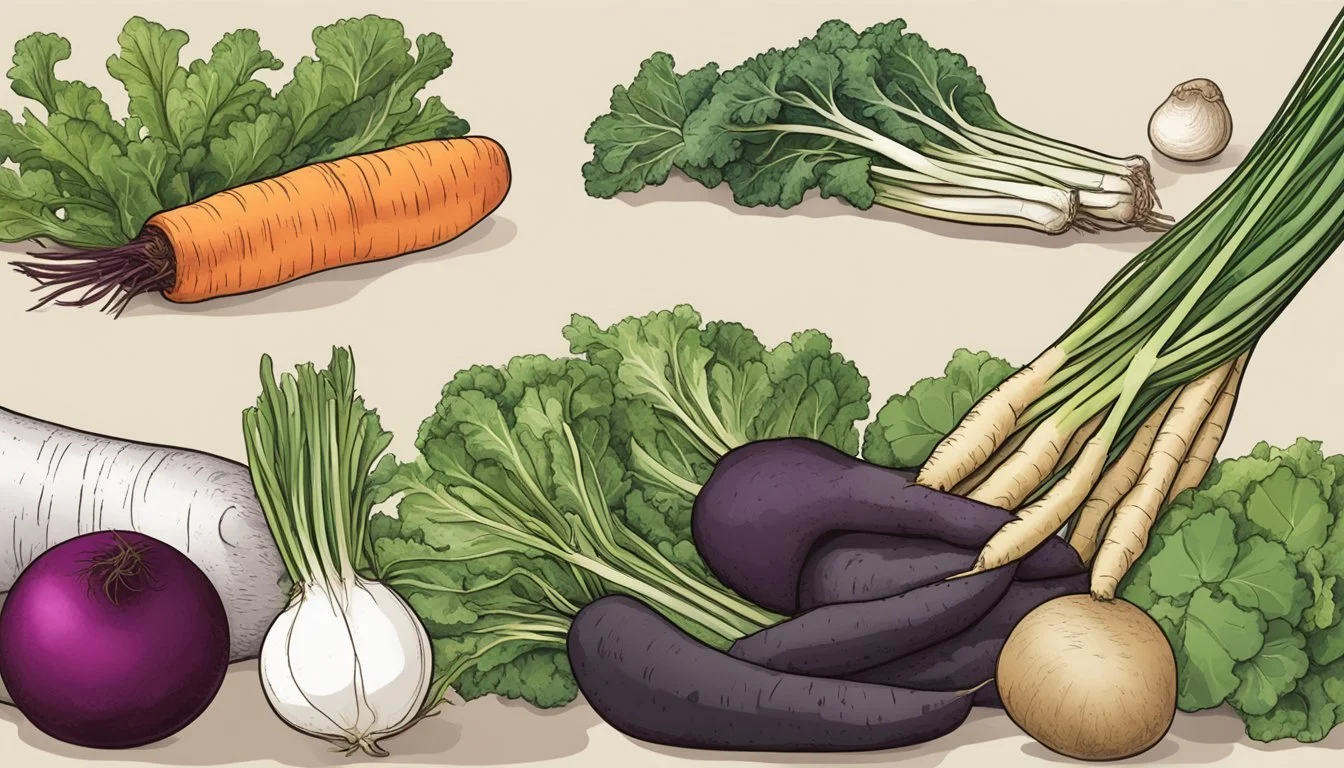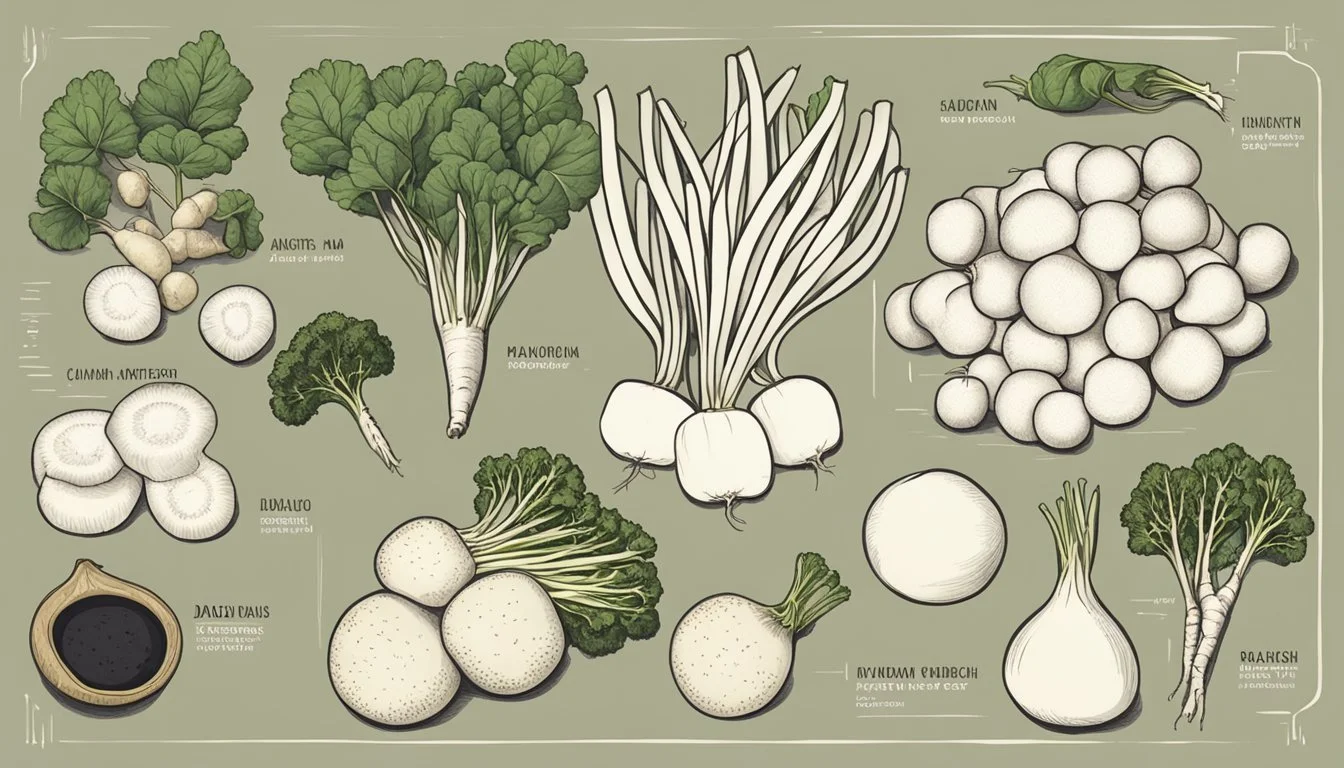Black Radish Substitutes
Top Alternatives for Your Recipes
For those who need an alternative to black radish, several substitutes offer similar flavor and texture profiles. Black radishes provide a distinct sharpness and firmness that elevates many dishes. Kohlrabi, with a slightly sweet taste and crisp texture, is a top substitute for black radish, delivering a comparable crunch.
Jicama is another excellent option, bringing a sweet, nutty flavor and a satisfying crunch, perfect for salads and slaws. For those seeking a spicier touch, horseradish root can mimic the pungent kick of black radish while adding a bit of heat to recipes.
Parsnips resemble black radishes in appearance and can be a viable substitute in cooked dishes, lending a mild sweetness and smooth texture. These alternatives ensure that your recipes maintain their depth and interest, even when black radish is unavailable.
Understanding Black Radish
Black radishes have unique characteristics, offer significant nutritional benefits, and can be used in diverse culinary ways. The information details the essential aspects of black radishes in terms of their traits, health value, and cooking potential.
Characteristics
Black radishes are notable for their dark, almost black skin and their large, round shape. They have a robust, earthy, and slightly spicy flavor that can add depth to many dishes. The flesh is white and crisp, often retaining a firm texture whether consumed raw or cooked.
In appearance, black radishes differ significantly from the more common red or white varieties, making them easily identifiable. Their bold taste can be somewhat potent when raw, which mellows out upon cooking. These radishes are typically available in fall and winter, making them a seasonal favorite for hearty recipes.
Nutritional Profile
Black radishes are highly nutritious, boasting a significant vitamin and mineral content. They are an excellent source of Vitamin C, which is vital for immune function and skin health. Additionally, they offer fiber, potassium, and magnesium, which contribute to digestive health, electrolyte balance, and muscle function.
Black radishes also contain antioxidants, which can help protect the body against oxidative stress and inflammation. Their nutritional profile makes them a healthy addition to various diets. Low in calories yet rich in essential nutrients, they can support overall health and wellness when included in meals.
Culinary Uses
In culinary applications, black radishes are highly versatile. They can be used raw in salads to bring a spicy, crunchy element. Sliced thinly, they pair well with a variety of greens and dressings. When cooked, their flavor becomes milder and more nuanced, making them a good candidate for roasting, which brings out their earthy sweetness.
They can also be included in soups and stews, adding both texture and depth of flavor. Besides, black radishes can be pickled to make a tangy condiment or side dish. This variety of uses makes black radishes a valuable component for both raw and cooked dishes, suitable for various culinary styles.
Selecting Substitutes for Black Radish
When choosing substitutes for black radish, it's crucial to consider factors like flavor profile, texture, and nutritional equivalence. These aspects will help ensure that the chosen alternative matches the original ingredient as closely as possible in your recipes.
Based on Flavor Profile
Black radishes are known for their pungent and peppery taste. If the goal is to match this intense flavor, horseradish root serves as an excellent option. Its spicy kick can replicate the sharpness of black radish.
For a milder flavor substitute, rutabaga or turnip provides a less intense but still satisfying taste. Both root vegetables offer a slight bitterness and sweetness, making them versatile in various dishes. Daikon radish is another viable substitute with a milder taste but still shares some peppery notes.
Based on Texture
Texture plays a major role in selecting the right substitute. Black radishes are firm and crispy. Jicama is an ideal alternative due to its similar crunchiness and structural integrity.
Parsnips also offer a comparable texture, although they are slightly softer. They can hold up well in cooking methods that require maintaining a crispy structure. Additionally, Daikon radish can provide a similar crunch while being slightly more tender.
Based on Nutritional Equivalence
Nutritional content is another important consideration. Black radishes are rich in fiber, vitamin C, and minerals like calcium and iron. Jicama can be a great substitute since it offers a good amount of fiber and vitamin C.
Rutabaga and turnip also provide valuable nutrients, including vitamin C and various minerals, while being low in calories. Daikon radish not only matches the low-calorie profile but also adds to the nutritional value with its vitamin content and essential minerals like potassium and magnesium.
By evaluating the substitutes based on these factors, one can ensure the chosen alternative successfully replicates the characteristics of black radish in culinary applications.
Substitute Vegetables for Black Radish
Finding a suitable substitute for black radish depends on the intended use, such as texture, flavor, or nutritional value. The following sections delve into various root vegetables, members of the Brassica family, and other suitable vegetable alternatives.
Root Vegetable Alternatives
Daikon Radish: This mild-flavored radish is a fantastic substitute for black radish. It shares a similar texture and can be used in raw or cooked dishes. Daikon is commonly used in salads, soups, and pickles.
Turnips: Turnips offer a slightly sweet and peppery flavor, making them a good alternative. They work well in soups, stews, and roasted dishes. However, they are less pungent compared to black radish.
Beetroot: Beetroots have an earthy flavor and vibrant color. Though their taste differs, they provide a similar crunch when raw and can be used in salads or roasted dishes. Be mindful of their sweeter taste.
Parsnips: The flavor of parsnips is sweet and nutty. While not directly akin to the bitterness of black radish, their texture can be an acceptable substitute in soups and stews.
Brassica Vegetable Alternatives
Kohlrabi: This versatile vegetable has a mild and slightly sweet flavor. It can be eaten raw, added to salads, or cooked in various dishes. Its crunchy texture makes it an excellent black radish substitute.
Cabbage: Shredded cabbage is a great alternative in dishes requiring a crunchy texture. Though it lacks the sharpness of black radish, it adds a refreshing crunch and is suitable for salads and slaws.
Napa Cabbage: This cabbage variety is tender and mild. It works well in soups, stir-fries, and fresh salads. Napa cabbage is particularly effective when a subtle crunch and light flavor are needed.
Broccoli: Though not a direct texture match, broccoli can be used in cooked dishes where a robust, mildly bitter flavor is suitable. It is best used in stir-fries and steamed preparations.
Other Vegetable Substitutes
Jicama: Known for its sweet and nutty flavor, jicama has a crunchy texture similar to black radish. It is ideal for raw applications in salads and slaws.
Water Chestnuts: Fresh water chestnuts provide a unique crunchy texture and a mild flavor. They can be an excellent substitute in stir-fries and salads where crunch is essential.
Carrots: Carrots offer a sweet alternative with a satisfying crunch. They can be used raw in salads or cooked in various preparations, keeping in mind their sweeter taste.
Bell Peppers: Bell peppers add color and sweetness to dishes. While they do not mimic the flavor of black radish, their crunch makes them suitable for fresh and cooked applications.
Cucumber: Cucumbers provide a crisp texture and refreshing flavor. They work well as a raw substitute in salads but lack the pungency of black radish.
This assortment of vegetables can effectively replace black radish in various culinary contexts, ensuring texture and flavor are adequately maintained.
Substituting Black Radish in Recipes
Black radish can be substituted with a variety of root vegetables that offer similar textures and flavors. Depending on the recipe, certain substitutes may fit better, whether used raw in salads, cooked in dishes, or pickled for extra tang.
For Salads and Slaws
Black radish provides a distinct crunchy texture and slightly spicy flavor to salads and slaws. One alternative is jicama, known for its crispiness and sweet, nutty taste. Use it at a 1:1 ratio for black radish. Another substitute is kohlrabi, which is slightly sweeter yet maintains the desired crunch. Daikon radish also works well, offering a milder flavor. For a slightly spicy kick, horseradish root mixed with vinegar and salt can be used sparingly.
For Cooking and Roasting
When cooking or roasting, black radish's firm texture holds up well. Turnips are an excellent substitute, providing a mildly peppery taste and becoming tender when roasted. Parsnips, with their sweet, earthy flavor, can be roasted to perfection, offering a unique twist. Carrots can also substitute, providing a sweet and slightly crunchy texture. Beets add a different flavor profile but contribute well to roasted dishes. Apply similar spices and roasting techniques used for black radishes to preserve the dish's essence.
For Pickling and Fermenting
Pickled and fermented black radish brings a spicy and tangy element to dishes. Daikon radish is a traditional choice for pickling and fermenting in kimchi or other pickled veggies due to its mild flavor. Cabbage can be used to create sauerkraut, providing a tangy crunch. Cucumber pickles, often made with vinegar and salt, offer a refreshing alternative. Carrots and cauliflower can also be pickled, absorbing the tangy brine beautifully and providing a different texture and flavor that complements many dishes.
Non-Vegetable Substitutes
Non-vegetable substitutes can effectively mimic the sharp, spicy, and distinct flavor profiles of black radish. These alternatives include horseradish and wasabi products, condiments like mustard and vinegar-based sauces, and even certain fruits that bring unique taste variations.
Horseradish and Wasabi Products
Horseradish root offers a peppery taste similar to black radish. It is typically used as a spice worldwide. Mixing grated horseradish root with salt and vinegar can create a pungent alternative.
Wasabi paste, made from the Japanese horseradish, delivers a powerful kick. Though often used in sushi, it can vary in intensity and may come in different forms such as fresh root or pre-made paste.
Horseradish sauce combines the spice of horseradish with sour cream or mayonnaise, providing a creamy, tangy substitute. Both horseradish and wasabi ensure a similar flavor burst without needing to prepare any vegetable.
Sauces and Condiments
Mustard offers a tangy and sometimes spicy alternative to black radish. Several mustard varieties, like Dijon or whole grain, can enhance dishes similarly. Mustard's bold flavor stands out in recipes needing a sharp bite.
Vinegar-based sauces are excellent for replicating the acidity and sharpness of black radish. Adding these sauces to salads, marinades, or dressings can emulate the radish's zesty effect.
Combining mustard with vinegar in sauces can balance the flavors, making an effective and versatile substitute. These condiments are easily accessible and require minimal preparation.
Fruits and Other Alternatives
Apple slices bring a crunchy texture and slight sweetness, matching the crunchiness of black radish. They pair well in salads or as a garnish.
Pear adds a delicate sweetness and crispness. It serves as a gentle replacement while enhancing different culinary profiles. Use it raw or slightly cooked for varied textures.
Mango offers a tropical twist with its tangy-sweet flavor, providing a vibrant and unexpected substitute. It can be used in salsas or salads to maintain a refreshing crunch.
These fruit alternatives introduce different flavor dimensions, making them suitable for various dishes where black radish’s distinctive taste is desired.
Considerations When Using Substitutes
When selecting a substitute for black radish, it is important to consider the implications on flavor, texture, and any dietary or allergy concerns the substitute may introduce.
Flavor Balancing
Black radishes have a strong, peppery flavor with a bit of spiciness that can dominate a dish. Substitutes like horseradish root, which also offers a spicy kick, or red radishes, with their slightly milder but still robust taste, might require adjustments to avoid overpowering the dish.
Using jicama can provide a sweet, nutty flavor as a contrast to black radish's spiciness. When using sweeter substitutes like parsnips, adding ingredients to balance the sweetness might be necessary. Consider using seasonings like vinegar or citrus to bring out a tangy note that can emulate the complexity of black radish.
Textural Implications
Black radishes offer a crunchy, crispy texture. When selecting a substitute, maintaining a similar texture is often crucial to preserve the integrity of the dish. Jicama and water chestnuts offer a comparable crunch and can be used in raw preparations like salads or slaws.
For dishes requiring cooking, parsnips can add a buttery texture when roasted or sautéed. Daikon radish, which is crunchy and less spicy, can also be an excellent substitute. Be mindful of the cooking times as more tender substitutes might require less time. Adjusting the preparation method can help achieve the desired textural match.
Dietary and Allergy Concerns
Dietary considerations are crucial when substituting ingredients. Some individuals might have specific allergies to certain vegetables. Ensuring that the chosen substitute does not introduce any allergens is vital.
For those with dietary restrictions, the nutritional content of substitutes should be considered. Black radishes are rich in vitamin C, magnesium, and potassium. Substitutes like jicama also provide important nutrients but may have different vitamin profiles. Evaluating the nutritional needs of the dish and compensating with other ingredients if necessary can help maintain the intended health benefits.
Ensure substitutes align with any dietary restrictions, particularly for individuals with allergies to certain foods like root vegetables. Checking labels and providing clear information about the substitutes used can help mitigate potential dietary issues.







